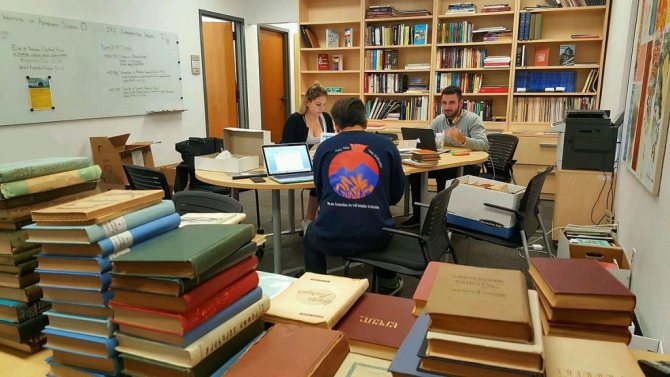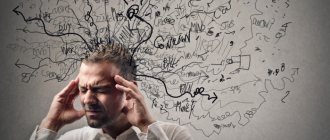A child’s poor performance at school and reluctance to attend classes is a common problem in many families. The reason for this may be the heavy workload of school programs and the inability of teachers to present information in an interesting way. You can increase concentration, memory and perseverance using various methods.
Eidetics is the science of memory development. It helps a person perceive information more effectively. The basic principle of eidetics is the following: any information can be presented in the form of pictures-images. This method of learning is used not just to improve memory, it makes the learning process a game. At the same time, children will strive to gain new knowledge and will not want to shy away from doing homework. Eidetics for children is a technique suitable for schoolchildren of any age.
Method No. 1. Make quick decisions
Take a piece of paper or set aside separate pages in your diary to catch yourself in those moments when you are completely out of focus. Divide the sheet of paper into three sectors: morning, afternoon, night, and every time you feel that your thoughts are somewhere not here, make a note in the corresponding sector. After some time, you will understand what part of the day you are most productive, and your thoughts will no longer be in the clouds. And this is all just thanks to a banal calculation.
This method also includes the need to always be aware of the problem. It helps to keep track of every time you lose concentration. Only understanding what and how you do will help improve your attention without any unimaginable effort. This way you will be able to identify the most “vulnerable” part of the day when you are distracted by everything. For example, it is always difficult for you to concentrate in the morning, but by lunchtime you turn into a real workaholic. Even just getting enough sleep and proper nutrition can improve your concentration.

Method No. 2. Free time
You can increase concentration and attention in an adult in the most common way - by setting aside time during the day and allowing yourself to wander in the clouds. Yes, yes, didn’t you think, the best way to improve concentration is to let it evaporate for a while. As practice shows, even specially designated free time increases concentration during the day. The simplest example is that you will work harder from 9 am to 3 pm, knowing that from 3 to 5 you can do what your heart desires. And you will also take on work with greater force after 5, as the brain will be ready for increased concentration. If you find yourself getting distracted during the time you're supposed to be working, remind yourself that you'll have a break soon and focus as much as possible on the task at hand.
Quadrant 3: Focus and Attentiveness
Many people would like to move into this quadrant as often as possible. Especially when you need to concentrate on one task for a long time. But this requires real effort and a lack of distractions.
If you need to go to this quadrant:
- If you work in a separate room, close the office door.
- If you work with colleagues in the same space, wear noise-canceling headphones.
- Inform your colleagues to avoid interruptions.
- Then shut up, turn off, or put away communication and information apps/devices/programs you're not using.
For many this can be difficult. We are so used to distractions that we become nervous when they are not there. When we need to focus and think deeply, often we just don't want to do it. Deep focus goes against our current habits, and we've become pretty bad at it.
But you can retrain your brain. One way is to develop awareness. This can be done through meditation, or you can start developing the habit of focusing on the present moment and tracking your physical state. Regular practice of this exercise helps restore concentration and improves the ability to concentrate.
Method No. 3. Oxygen supply to the brain
What carries oxygen throughout our body? That's right, blood. However, in normal life, most of the oxygen in the body occurs in the lower part of the body, while the brain may suffer from a shortage. To provide your body and, first of all, your brain with a sufficient portion of oxygen, get up more often, walk, and do simple physical exercises. You can even study at work, sitting in a chair. Also, do not forget to give your brain a rest; long hours of concentration contribute to the deterioration of brain activity. As a result, that same concentration and attention decreases. Take breaks and don't overload yourself.

Memory development in children: brain exercises
- Make both the right and left hemispheres of the brain work. To do this, take two pencils, in your right and left hand, and then draw two shapes at the same time.
- For a minute, stroke yourself on the head with your left hand, and beat a fraction on the table with your right. After a minute, change the actions for each of your hands - beat off a fraction with your left, and stroke your head with your right.
- Do familiar things in a new way. Any non-standard behavior forms new neural connections, which means it improves brain function.
- Take innovative approaches to learning. For example, a child learns the rule: “non-verbs are written separately.” Invite him to imagine that the verb is a football player, and the particle “not” is a ball that needs to be thrown back.
- Learn poems and songs with your child. Key words of sentences can be drawn in the form of vivid images.
- When learning a sequence of words, ask your child to come up with a story in which the memorized words will be arranged in the right order. This method perfectly trains memory and develops imagination.
- Psychologists confirm that emotionally charged events are remembered faster. To imprint something in your memory, draw analogies and create associations. The more bright images, the better.
- Write down new English words and mathematical formulas on stickers and hang them where you are sure to come across them.
- Repeat what you especially need to remember before going to bed.
There are various games to develop memory and logic with interesting tasks and puzzles. Adequate sleep, good physical activity, proper nutrition - all these are important conditions for improving memory and brain function.
Method No. 4. Don’t put it off until later and finish it to the end
Psychologists do not advise starting a new project before finishing the old one. This way you tell your brain that it is normal to switch from one thing to another. As a result, complete defocus occurs. To improve concentration, you need to finish one task and only then start a new one. This applies even to such everyday little things as reading a book. It is not recommended to start a new one when the old one is not finished yet. This technique will help increase the child's concentration.
Quadrant 1: Reactions and distraction
If you feel like you have little control over your attention, you are in quadrant 1. Here you are distracted and reactive to both internal and external stimuli. Because of this, your attention constantly switches from task to task.
At such moments, you may not even realize how distracted and ineffective you are. If you spend most of your time in this state, you may feel like the days are going on forever and everything seems tiresome and unbearable. Most people find themselves in this state at work.
You've probably had similar situations: you're working on a complex table for a report or a client project. And then a notification of a new email arrives. You go to your mail to view the letter. If the issue is urgent or the task can be completed quickly, you will most likely switch to this. But it's not that simple. A colleague comes up to you and asks a question. You open the desired program and try to help your colleague. As soon as he leaves, you return to the letter, but suddenly a reminder sounds about a meeting with a client. Coming from a meeting, you see three more new letters. You close the first one because you need to think and open the next one. You have several tabs open on your computer. You started three things but didn't finish any. And the table still remains unfilled.
A scenario similar to a typical day for many company employees. You simply cannot pay attention to anything for more than a few minutes. Every new email, every reminder, and every colleague who comes to your desk steals your attention. As a result, this constant switching from task to task becomes a habit. And it seems impossible for you to concentrate on anything for a longer period of time. Moreover, this habit extends to everyday life. How many times a day do you turn on your smartphone? In 2020, Apple reported that iPhone users unlocked their phones 80 times a day! Most likely, today this figure will be higher.
Method No. 5. Everything has its place and time
Any work should be done at a table, not in bed or on the sofa. The bed is a place to sleep, let it remain that way. The table is precisely the workplace, here we will learn how to increase concentration. Everything is simple here, our mind is a mysterious thing. As soon as we go to bed with a laptop, associations arise in our brain: the bed is a place to sleep, how can you concentrate here? Remember, you need to work only in a specially designated place, otherwise there will be no trace of concentration left.

How to improve memory and develop attention in adults
The level of concentration is determined by the duration of concentration on one activity or object. Psychologists have found that this figure has been steadily declining in recent years. According to their calculations, in a year this time period was on average 12 seconds, and in this year it was only 8. This is due to an exaggerated loss of focus of attention - a property that is opposite to the voluntary concentration of consciousness. Imagine a picture: a fisherman sits on the river bank with a fishing rod and is completely absorbed in contemplating the float.
How many times have you been unable to find the remote control when it was in a visible place? How often have you been surprised at the absent-mindedness of old people?
.
VIDEO ON THE TOPIC: Cognitive impairment
Concentration aids
In addition to the above methods, there are hundreds more, but all of them are meaningless if you do not follow the simplest rules:
- If you want to sleep, then it will definitely be difficult to concentrate. That is why proper sleep is above all else.
- Create a cozy and calm environment at your desk, this will definitely help improve your concentration.
- Divide your day into concentration time and relaxation time. Don't allow yourself to be distracted by trifles and reward yourself for successfully completed tasks.
- Even your mood plays an important role; if it is not there, then most likely you will waste your time. So get ready to work.
- Whenever your self-confidence wanes, think about your past achievements.
- Don't force yourself, everything should be in moderation.
- There are even foods that increase concentration: blueberries, green tea, avocados, nuts, dark chocolate, water, and so on.
When you feel like giving up, remember that the greatest people would not have achieved anything in their lives if they had not been able to concentrate.

Analyze your behavior
Poor concentration manifests itself differently in each person. We are all individual, some do not know how to listen carefully, and therefore meetings or lectures at the university are empty words for them, others quickly lose the essence of the conversation or the main thread of mental work, some are distracted by even the smallest sound. Start working with concentration by analyzing yourself, determining what prevents you from concentrating. This will allow you to find out not only the essence of the problem, but also find a way to solve it. This is especially true of how to increase a student’s attention and concentration.

Memory tablets
Low performance in school may well be due to distracted attention. Nootropic drugs to improve memory will help solve the problem; they can increase blood circulation in the brain and concentration. Nootropics have a positive effect not only on the intellectual abilities of children and adults, they also normalize the general condition of the nervous system. Such memory improving medications contain neurotransmitters, vitamins and amino acids. Another active component of this product is glycine. This substance reduces psycho-emotional stress and has a positive effect on mental abilities. You can buy a nootropic drug after consulting a doctor.
Substances that are directly related to memory: calcium, iodine, copper, manganese, iron, magnesium, zinc, niacin, folate, choline, lecithin, vitamins B1, B6, B12 and C. These substances are contained in dietary supplements (dietary supplements) , which are not drugs, and also in natural products.
- The brain needs glucose as a source of energy. To compensate for its deficiency, you need to eat foods that improve memory - bananas, potatoes and grapes.
- Natural stimulants of brain activity are B vitamins. They are found in cereals, milk, liver and yeast.
- Lean meat, sesame seeds and apples contain iron, which is responsible for normal hemoglobin levels in the blood.
- Zinc and copper activate thinking. They are found in cauliflower, sunflower seeds and oatmeal.
- Lecithin is responsible for normal growth and development of the body; it is also needed to ensure concentration and favorable brain function. Its main sources: nuts, herring, eggs, butter.
- Magnesium and calcium are found in cheese, avocado, sesame and mango.
The brain is made up of 85% water. A deficiency of even 2-3% of water can significantly reduce brain activity. To be able to quickly solve problems and remember rules, a teenager needs to drink at least two liters of water a day.
The brain, like the body, needs constant training, otherwise it simply loses its tone.
Create a bell jar and collect your thoughts
If noise and people interfere with your concentration, you need to learn to visualize a “glass cap,” that is, isolate yourself from any source of noise. This is difficult in the modern world, but try to find a place that will help you spend at least a few hours in complete silence. Full concentration is impossible not only without external, but also without internal peace. No quiet place will help if you don't collect your thoughts and relax. Plan how you will perform this or that task and calmly start doing the work.
Train and motivate yourself
Are you wondering how to improve your concentration? Learn to train your memory. If it is well trained, you won't have to spend a lot of time trying to remember anything important. You will be able to easily operate with the information that is stored in your head. Every small step towards improving memory is also a step in developing concentration. Motivation should not be overlooked either. If we like a task, we complete it quickly and easily. But the situation changes dramatically when we need a push to complete a task. Try to find benefits and benefits for yourself in any situation, even if you don’t like the upcoming work at all.

Symptoms of cognitive disorder
Symptoms of cognitive disorder often occur when a person has low self-esteem. For this reason, he may suffer from confusion and forgetfulness. Below are some symptoms of cognitive dysfunction:
•Inability to concentrate on a task •Poor concentration •Difficulty solving problems and learning new tasks •Disorientation that can last up to 60 seconds, as well as inability to think clearly •Memory loss (or short-term memory), increased fatigue during mental work •Inability to quickly find the right word or its synonym •Frequent awakenings or sleep disturbances •Sharp decline in mental performance and inability to think clearly •Poor development of spatial thinking
Let's say no to overwork
When planning your day, always correctly calculate your strengths and do not try to jump above your own head. Usually, when we add more tasks to our to-do list than we can physically complete, at the end of the day we feel frustrated that there is not a tick next to each line. Plan your day carefully, and most importantly, rationally. Put on the list only what you can actually accomplish, and if you manage to do more, you can only applaud yourself.

Methods to combat cognitive dysfunction
•Keep drinking regime. Drink at least 8 glasses of water a day and eat a balanced diet rich in vitamins and minerals. •Include green leafy vegetables in your diet. For example, spinach is rich in vitamin A and iron. They promote proper brain function and improve memory. •Eat foods rich in Omega-3 fatty acids. These include flax seeds, walnuts, eggs and fish such as salmon, sardines, tuna or mackerel. •Include whey protein, brown rice and pumpkin in your diet.
Of course, identifying the causes of cognitive impairment takes time, but eventually your condition will improve.
Share link:
And nowhere without self-control!
Our thoughts are free, they are difficult to control and sometimes they spin in our heads without our desire. But one thing is absolutely certain: we can influence their course and direction. When you notice that your thoughts are starting to wander somewhere away from the main task, just “talk to yourself.” Tell yourself “stop” and return to the task you are busy doing. This also applies to problems; if our head is filled with them, then there can be no talk of any concentration. To avoid this, you need to either solve all the problems or change the way you think about them. This is where visualization comes to the rescue.










